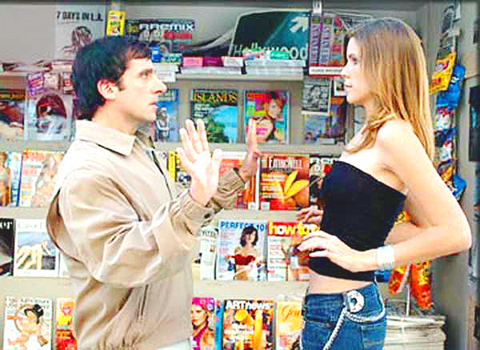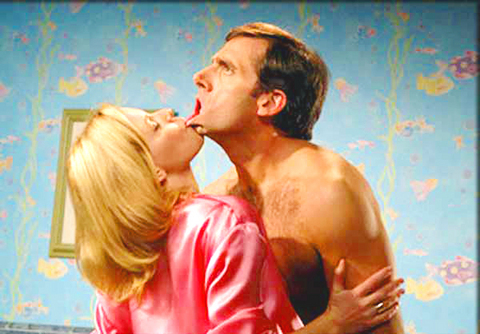What does a 40-year-old male virgin look like when he is not living in his parents' basement, adrift on a cloud of bong smoke? In the case of Andy Stitzer, the title character played by Steve Carell in the charmingly bent comedy The 40-Year-Old Virgin, he wears the dreamy look of the undefiled familiar from Renaissance paintings of saints and martyrs, and from 1950s suburban pastorals like Leave It to Beaver. As captured in the poster for the film, which shows Andy gazing rapturously into the distance, it is a look that conveys an almost incomprehensible happiness -- as if the Beav had grown up and achieved beatitude, rather than a house, a wife and 2.5 kids.
Sex has become so desacralized, it seems hard to believe that anyone, especially an apparently healthy man living in the age of Madonna and Maxim, Pamela and Paris, has managed to avoid getting some with someone, somewhere, at some point. Thirteen years ago, when Madonna released her hardcover, soft-core elegy to her body and herself, there was still something novel, even a little shocking about sex as a public performance. Now, with sexually explicit videos a rite of celebrity passage, hard-core pornography just a mouse click away and the girl next door having metamorphosed into a girl gone wild, or so it would seem, who isn't doing it?
Andy, for one: a loner geek by circumstance rather than conviction, this accidental virgin works in an electronics store with the usual bunch of genial misfits. The rest of the time, Andy tends to his solitude in a modest Southern California apartment crammed with boyhood collectibles, many still in their original packaging. He likes to watch Survivor with his neighbors ("I'll bring the soda!"), an elderly couple who cluck over him like grandparents, but Andy seems most at ease surrounded by these regressive totems. Among his prize possessions are action figures, including of the Six Million Dollar Man (and the Six Million Dollar Man's boss) and miniature toy soldiers he meticulously paints under a magnifying glass, imparting to them a richness of detail absent from his own life.

PHOTOS: FOX MOVIES
Andy puts away these childish things at least temporarily after three of his fellow workers stumble onto his secret, throwing a wrench into his orderly, celibate existence. One night, while attempting to share a tale of sexual braggadocio, he compares a woman's breast to a "bag of sand." Quickly scoping out the truth of his situation, the three embark on a rescue mission to deflower (by proxy) this shrinking violet. But the guys are hapless when it comes to women -- one is brokenhearted (Paul Rudd as David), one is a compulsive cheat (Romany Malco as Jay), the third is merely clueless (Seth Rogen as Cal) -- and their schemes invariably fizzle rather than sizzle, often to sidesplitting effect.
Until now, Carell, who wrote the screenplay with the film's director, Judd Apatow, has perhaps been best known as one of the correspondents on The Daily Show With Jon Stewart. His other big- and small-screen credits have been more negligible (in one film he is credited as "Mail Room Guy Without Glasses"), which hasn't prevented him from generally stealing whatever bits and pieces have been tossed his way in entertainments like Anchorman and Bewitched. Even a starring role in the American version of the British show The Office, which has given Carell a higher profile, conveys neither his sheer likability nor his range as an actor, both crucial to making this film work as well as it does.
Buttoned-down and mild-mannered, Carell tends to look like either a congenial high school teacher or a functionary just one grievance away from blowing like Krakatoa. The actor's tamped-down performance style, propelled by his heavy, lurching eyebrows, dovetails nicely with Apatow's relatively low-key direction. (Relative for a film with so many penis jokes, that is.) Outside of a mildly disgusting scene involving a regurgitated strawberry daiquiri, the two collaborators generally avoid the bodily-fluids humor perfected and almost exhausted by the Farrellys, which has become a tedious mainstream comedy cliche. Even so, Apatow and his very brave or very foolish star do manage to raise the comedy bar with an excruciatingly funny scene involving body waxing that trumps Jackass extremism and is a perverse testament to Carell's dedication to his art.

Like Wedding Crashers, The 40-Year-Old Virgin eventually shifts focus from sex to romance, and without the other film's wink-wink, nudge-nudge subtext. Andy finds a real, grown-up woman, a divorced mother played by the wonderful Catherine Keener, who sincerely takes to him, bachelor eccentricities and all. The commercials for the film give away far too many of its biggest, loudest jokes, including the body waxing and the sly sendup of the reflexive homophobia that has become a genre staple. What the ads can't (or don't) disclose is the genuine warmth and feeling with which the couple's romance advances.


The canonical shot of an East Asian city is a night skyline studded with towering apartment and office buildings, bright with neon and plastic signage, a landscape of energy and modernity. Another classic image is the same city seen from above, in which identical apartment towers march across the city, spilling out over nearby geography, like stylized soldiers colonizing new territory in a board game. Densely populated dynamic conurbations of money, technological innovation and convenience, it is hard to see the cities of East Asia as what they truly are: necropolises. Why is this? The East Asian development model, with

June 16 to June 22 The following flyer appeared on the streets of Hsinchu on June 12, 1895: “Taipei has already fallen to the Japanese barbarians, who have brought great misery to our land and people. We heard that the Japanese occupiers will tax our gardens, our houses, our bodies, and even our chickens, dogs, cows and pigs. They wear their hair wild, carve their teeth, tattoo their foreheads, wear strange clothes and speak a strange language. How can we be ruled by such people?” Posted by civilian militia leader Wu Tang-hsing (吳湯興), it was a call to arms to retake

Desperate dads meet in car parks to exchange packets; exhausted parents slip it into their kids’ drinks; families wait months for prescriptions buy it “off label.” But is it worth the risk? “The first time I gave him a gummy, I thought, ‘Oh my God, have I killed him?’ He just passed out in front of the TV. That never happens.” Jen remembers giving her son, David, six, melatonin to help him sleep. She got them from a friend, a pediatrician who gave them to her own child. “It was sort of hilarious. She had half a tub of gummies,

The wide-screen spectacle of Formula One gets a gleaming, rip-roaring workout in Joseph Kosinski’s F1, a fine-tuned machine of a movie that, in its most riveting racing scenes, approaches a kind of high-speed splendor. Kosinski, who last endeavored to put moviegoers in the seat of a fighter jet in Top Gun: Maverick, has moved to the open cockpits of Formula One with much the same affection, if not outright need, for speed. A lot of the same team is back. Jerry Bruckheimer produces. Ehren Kruger, a co-writer on Maverick, takes sole credit here. Hans Zimmer, a co-composer previously, supplies the thumping